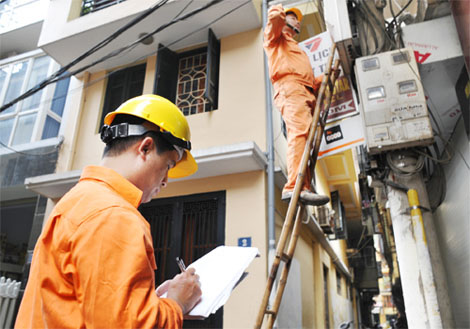EVN’s tragic business results released

The timetable for further electricity price rises has yet to be confirmed
This is the first time that EVN’s business results have been made public.
The group incurred losses from its own electricity production and trading, irrespective of the staggering loses accumulated from speculative investments in other non-core sectors.
Last year, EVN’s electricity revenues totalled VND90.934 trillion ($4.32 billion), equivalent to an average power selling price of VND1,061.4 per kWh.
The group’s electricity production and trading costs totalled VND101.096 trillion ($4.81 billion) over the year, equivalent to an electricity cost price of VND1,180 per kWh.
The ministry noted that the costs had yet to include spending of VND15.463 trillion ($735.9 million) to cover a disparity in foreign exchange rates as well as a spending of VND356 billion ($16.94 million) on taking over substandard rural electricity grids from local authorities in 2010.
In 2010, power generation costs topped the list at VND78.498 trillion ($3.73 million); followed by power distribution cost at VND16.208 trillion ($771.4 million). Power transmission was bottom of the list for costing only VND5.626 trillion ($267.7 million) during the year.
The ministry attributed EVN’s losses to decreased hydropower capacity, which forced the group to run oil-fueled turbines at higher costs, in addition to buying electricity from China at higher prices.
Sluggish construction of several power projects and fluctuations in foreign exchange rates and fuel prices also added to the situation, the ministry noted.
EVN general director Pham Le Thanh said the electricity sector currently incurs a loss of VND300 per kWh in electricity sales.
Thanh warned that if no drastic measures are taken to deal with the group’s financial imbalance, it would find it increasingly difficult to raise capital in the time to come and investors might be discouraged from investing in power projects, particularly in the southern region, adding to power shortages.
In order to help EVN overcome the situation, Deputy Minister of Industry and Trade Hoang Quoc Vuong said that the group’s losses would be offset by future power price hikes. He, however, did not clarify the exact timetable for the electricity price rises.
Concerning EVN’s non-core business, Thanh said that the group had planned to gradually withdraw all of its investments from non-core businesses, especially telecommunications, with EVN Telecom to be transferred to military-run Viettel telco.
EVN will withdraw its investment in securities, banking and real estate during the next two years, he added.
Despite moaning over losses, EVN revealed that its employee salaries averaged a whopping VND7.3 million ($347.4 million) per month in 2009, while the earnings of top executives remains shrouded in mystery.
For 2010, Thanh did not mention salary expenditure but said that the aforementioned VND10.162 trillion ($483.76million) in losses represented 95 per cent of the group’s salary cost during the year.
He added that employees in the electricity industry found it difficult to afford to live in major cities with such ‘modest’ payment.
Minister of Labour, Invalid and Social Affairs Pham Thi Hai Chuyen batted away the claims, saying they were unpersuasive and that the ministry would inspect EVN’s losses further.
What the stars mean:
★ Poor ★ ★ Promising ★★★ Good ★★★★ Very good ★★★★★ Exceptional
Related Contents
Latest News
More News
- State corporations poised to drive 2026 growth (February 03, 2026 | 13:58)
- Why high-tech talent will define Vietnam’s growth (February 02, 2026 | 10:47)
- FMCG resilience amid varying storms (February 02, 2026 | 10:00)
- Customs reforms strengthen business confidence, support trade growth (February 01, 2026 | 08:20)
- Vietnam and US to launch sixth trade negotiation round (January 30, 2026 | 15:19)
- Digital publishing emerges as key growth driver in Vietnam (January 30, 2026 | 10:59)
- EVN signs key contract for Tri An hydropower expansion (January 30, 2026 | 10:57)
- Vietnam to lead trade growth in ASEAN (January 29, 2026 | 15:08)
- Carlsberg Vietnam delivers Lunar New Year support in central region (January 28, 2026 | 17:19)
- TikTok penalised $35,000 in Vietnam for consumer protection violations (January 28, 2026 | 17:15)

 Tag:
Tag:




















 Mobile Version
Mobile Version